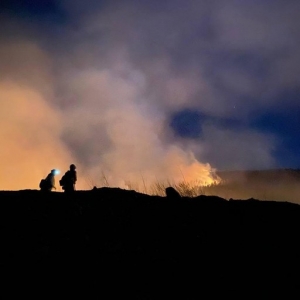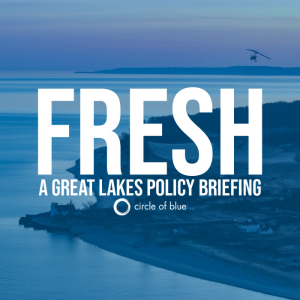Federal Water Tap, August 8: $4 Billion for Western Drought in Inflation Reduction Act
The Rundown
- Arizona Sen. Kyrsten Sinema inserts $4 billion for western drought response in spending bill — money that could pay farmers not to withdraw Colorado River water.
- EPA and USDA will work with poor, rural communities to identify federal funds for failing wastewater systems.
- The White House releases a federal strategy for research into unregulated contaminants in drinking water.
- EPA researchers will host a webinar on repairing building plumbing after wildfires.
- FEMA selects projects for a $1 billion climate and flood resiliency program.
- USGS research in Iowa shows the water-quality benefits of reconnecting rivers and floodplains.
- NOAA releases a high tide flooding forecast through next April.
- The Biden administration seeks public comment on an environmental justice scorecard for federal agencies.
- The EPA publishes guidance for utilities for lead service line inventories.
- President Biden will sign a bill to allow veterans and their families to sue the government over drinking water contamination at Camp Lejeune.
And lastly, Columbia River salmon recovery continues to be a hot-button issue.
“It is futile and irresponsible to spend further taxpayer dollars considering dam breaching. But this reality has not prevented the administration or other political actors from continually pushing against the intent of Congress to protect both the species and the numerous benefits from the Columbia River Federal Power System.” — Sen. James Risch (R-ID) speaking on the Senate floor on July 28. Risch opposed a provision in the Water Resources Development Act that authorizes a study of aquatic habitat restoration in the Columbia River basin. Whether to breach four dams on the Snake River to assist salmon is a major policy question in front of Pacific Northwest leaders.
In a separate action, the Interior Department announced a stay in a lawsuit brought by states and tribes over management of 14 federal dams on the Columbia River for the benefit of salmon. The stay extends through August 31, 2023.
By the Numbers
53: Projects selected by FEMA in fiscal year 2021 for $1 billion in climate change and flood resilience grants under the BRIC program. Savannah, Georgia, for instance, received $30 million to improve stormwater drainage in the flood-prone and historically Black area of Carver Village.
News Briefs
Billions for Drought Response
Arizona Sen. Kyrsten Sinema successfully lobbied for $4 billion in drought response funds to be inserted into the Inflation Reduction Act, money that could be used to pay farmers to forgo water withdrawals.
The money is for “grants, contracts, or financial assistance agreements” in the 17 western states where the Bureau of Reclamation operates, with priority for the Colorado River basin and other severely dry areas.
Options include compensation for reducing water diversions, ecosystem restoration, and conservation projects.
Farmers in southern Arizona have circulated a plan along with counterparts in California that could reduce irrigation withdrawals from the lower Colorado River by nearly 1 million acre-feet.
In context: Arizona and California Farmers, Targets for Colorado River Cuts, Draft Their Conservation Strategy
Failing Wastewater
Two federal agencies said they will work with poor and rural areas that have failing or inadequate wastewater systems to identify federal funding sources to help fix the problems.
The Environmental Protection Agency and Department of Agriculture selected 11 communities for their initiative. The communities are:
- Bolivar County, Mississippi
- Doña Ana County, New Mexico
- Duplin County, North Carolina
- Greene County, Alabama
- Halifax County, North Carolina
- Harlan County, Kentucky
- Lowndes County, Alabama
- McDowell County, West Virginia
- Raleigh County, West Virginia
- San Carlos Apache Tribe, Arizona
- Santo Domingo Pueblo, New Mexico
In context: Straight Pipes Foul Kentucky’s Long Quest to Clean Its Soiled Waters
Hydropower Licensing
Republicans on the House Energy and Commerce Committee wrote to the chairman of the Federal Energy Regulatory Commission requesting information on the implementation of hydropower licensing provisions in a federal water infrastructure bill.
The America’s Water Infrastructure Act of 2018 expedited some licensing requirements in order to expand hydropower generation.
Lead Service Line Inventory
The EPA published guidance to help water utilities create and maintain an inventory of lead lines in their service areas.
Recent changes to federal rules require utilities to submit an initial inventory by October 2024.
Studies and Reports
Unregulated Contaminants Research Strategy
The White House science office published a national research strategy for identifying, analyzing, monitoring, and treating unregulated contaminants in drinking water.
These “contaminants of emerging concern” include PFAS chemicals, solvents, pesticides, plastics, and many others that do not have national regulatory standards.
The five goals in the strategy focus on coordination, communication, risk reduction, decision-making tools, and threat identification.
High Tide Flooding Outlook
The number of high tide, or “sunny day”, floods is expected to be highest in the coming year on the Atlantic and Gulf coasts, according to a NOAA forecast.
Researchers expect between three and seven days of high tide floods between May 2022 and April 2023.
Because of rising seas, these floods are occurring more frequently.
In context: Hidden Flood Risk for San Francisco Bay Area Communities Lurks Underground
Floodplain Restoration Shows Water-Quality Benefits
U.S. Geological Survey researchers found that reconnecting even a small stream with its floodplain yields ecological benefits.
The case study was the Maquoketa River in Iowa’s heavily agricultural portion of the upper Mississippi River basin. A levee failure in 2010 reunited the river with the floodplain.
Allowing the floodplain to flood removed sediment and nutrients from the water, improving downstream water quality.
On the Radar
Post-Disaster Plumbing Repair
EPA researchers will host a webinar to discuss remediation of building plumbing after a disaster such as wildfire and how to rid the pipes of contaminants.
The webinar will be held on August 10 at 2:00 p.m. Eastern. Registration is required.
In context: Plastic Pipes a Water Contamination Risk After Fire, Data Shows
Feedback on Environmental Justice Scorecard
The White House Council on Environmental Quality is seeking public comment on a grading system it will use to evaluate how well federal agencies are addressing pollution impacts on poor and minority communities.
The grades will focus on three areas: reducing pollution burdens, distributing benefits of federal investment, and engaging communities in decision-making.
Responses are due October 3 and should be submitted via www.regulations.gov using docket number CEQ-2022-0004.
Camp Lejeune Water Contamination
Today, President Biden is expected to sign the PACT Act, a bill to address service member exposure to toxic hazards.
A provision in the bill allows military veterans, their families, and others who were exposed to toxic water at Camp Lejeune to sue the federal government for compensation.
The drinking water at the North Carolina marine base was contaminated with the solvents TCE and PCE, plus benzene and other industrial chemicals from 1953 until 1987.
Federal Water Tap is a weekly digest spotting trends in U.S. government water policy. To get more water news, follow Circle of Blue on Twitter and sign up for our newsletter.
Brett writes about agriculture, energy, infrastructure, and the politics and economics of water in the United States. He also writes the Federal Water Tap, Circle of Blue’s weekly digest of U.S. government water news. He is the winner of two Society of Environmental Journalists reporting awards, one of the top honors in American environmental journalism: first place for explanatory reporting for a series on septic system pollution in the United States(2016) and third place for beat reporting in a small market (2014). He received the Sierra Club’s Distinguished Service Award in 2018. Brett lives in Seattle, where he hikes the mountains and bakes pies. Contact Brett Walton







Leave a Reply
Want to join the discussion?Feel free to contribute!